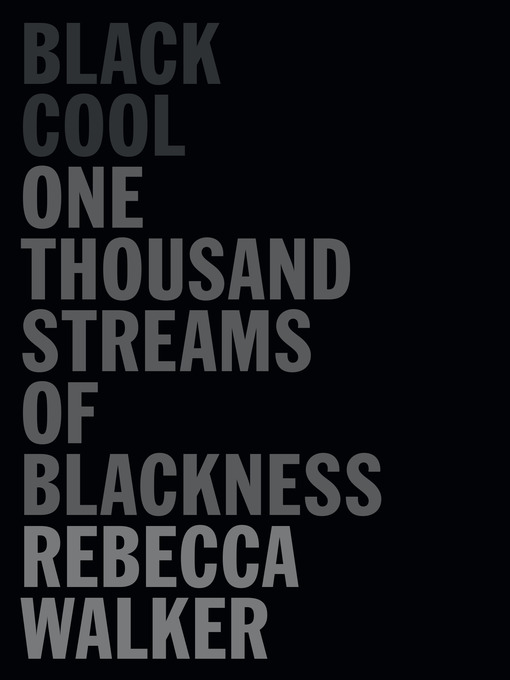
Black Cool
One Thousand Streams of Blackness
کتاب های مرتبط
- اطلاعات
- نقد و بررسی
- دیدگاه کاربران
نقد و بررسی

December 12, 2011
Despite the slenderness of this collection of essays on the zen of cool by several influential cultural visionaries, Walker (Black, White and Jewish) knows how to approach a fashionable theme from all angles. After an informed foreword by historian Henry Louis Gates Jr., the various commentaries on the fundamentals and potential of this African-American cultural export domestically and globally are written by such trendsetters as writer Mat Johnson, performing artist Staceyann Chin, critic Dream Hampton, photographer Dawoud Bey, writer Veronica Chambers, essayist Miles Marshall Lewis, critic Margo Jefferson, fashion maven Michaela Angela Davis, and educator-activist bell hooks. Three of the standouts are Chamber’s “Hunger,” Chin’s “Authenticity,” and hooks’s “Forever,” where elements of the personal give meaning to the topic and touch the reader in a significant way. While Hampton discusses “Audacity” as mastering fear and Bey explains “Swagger” as “a way to reclaim and celebrate viscerally an aspect of self that has historically eroded,” Lewis pays tribute in “Always Evoking” to the sound sorcerer Miles Davis, a musician of the cool sound whose constant mode was change. Walker and her band of scribes are in top form, giving a rich, varied picture of Black cool style at its most frosty.

December 15, 2011
A collection of essays focused on the "cool" cultural legacy of African-Americans. In her latest work, writer/editor Rebecca Walker (Baby Love: Choosing Motherhood After a Lifetime of Ambivalence, 2007, etc.) assembles the writings of 16 prominent thinkers in an attempt to define "Black Cool," a phrase utilized to encompass African-American's self-confidence and swagger. Staceyann Chin's "Authenticity" recounts her coming-of-age in Jamaica, during which she stumbled upon the healing powers of cool. "My newfound swagger sustained me through the rest of my teens," she writes. "It nurtured an unyielding sense of self that served me well when I moved from Montego Bay to attend college in Kingston." In "Geek," Mat Johnson defines black cool by describing how it feels to lack it. A self-tagged "black geek"), he admits that "[b]lackness can be a rigid, didactic identity, with people stepping out of line facing ridicule and admonishment or worse: condemnation." Yet Hank Willis Thomas argues that black cool needn't be naturally possessed; it's simply a commodity for purchase: "A crisp, clean pair of brand spanking new Air Jordan sneakers was a supreme status symbol for anyone who wanted to be cool and ‘down with the streets.' " Thomas takes the intangible concept of black cool and quite skillfully grounds it between a pair of Nike swooshes." While the aforementioned essays employ personal anecdotes to spur thoughtful debate, a few of the pieces feel tonally at-odds with the rest. This is particularly true of Michaela Angela Davis' contribution, which reads more like a fiery manifesto in which she makes clear that non-blacks can never possess "our cool ass Black style." It's an interesting concept, but the author's informality and defensive tone proves less successful than the collection's subtler pieces. Other contributors include Margo Jefferson, Veronica Chambers, Dawoud Bey and the ubiquitous Henry Louis Gates Jr., who provides the foreword. An occasionally unbalanced yet probing collection grappling with the true meaning of "Black Cool."
(COPYRIGHT (2011) KIRKUS REVIEWS/NIELSEN BUSINESS MEDIA, INC. ALL RIGHTS RESERVED.)

February 1, 2012
Walker offers up a collection of perspectives on black cool, the not easily defined state of being complex and unique in the context of the African diaspora. Clearly, variation rules over uniformity, as contributors from Henry Louis Gates Jr. to bell hooks to Dawoud Bey expound on black coolness, something ever expanding, fluid, evasive, and a safety valve for many complex emotions and experiences. Valerie Thomas focuses on the musical space referred to as the break as reflective of unknown possibility with the black experience. Mat Johnson recalls finding his cool in the counterintuitive inner geek as a young boy. Rachel Harper recalls the redemptive cool in her poetic-artistic father, who may have been depressed. Michaela Angela Davis finds cool in her resistance and asserts the need to resist exploitation of black cool. Others write of inner and outer struggles against racial anger, and cultural norms and traditions. Walker offers great space and span in this work, which is highly compatible with the postblack perspective, which is constantly expanding expressions of blackness.(Reprinted with permission of Booklist, copyright 2012, American Library Association.)

























دیدگاه کاربران